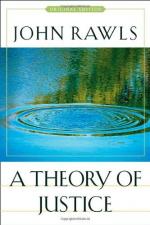
|
| Name: _________________________ | Period: ___________________ |
This test consists of 5 multiple choice questions, 5 short answer questions, and 10 short essay questions.
Multiple Choice Questions
1. Who was the father of Utilitarianism?
(a) Spinoza.
(b) Jesus Christ.
(c) Karl Marx.
(d) David Hume.
2. What is the first virtue of social institution, according to Rawls?
(a) Militarism.
(b) Wealth.
(c) Justice.
(d) Strength.
3. What does Rawls want his theory of justice to be?
(a) The dominant political view.
(b) Something to remember.
(c) Something to destroy the theories of Utilitarianism.
(d) A viable alternative to other theories.
4. Why did Hobbes see the necessity of the Social Contract?
(a) Because he thought people were naturally brutish.
(b) Because he thought it would help the British Empire.
(c) Because he thought people were stupid.
(d) Because he thought that was the law of nature.
5. How, according to Rawls, does justice help to assign rights and duties?
(a) It ensures that there is an equal distribution of such.
(b) It enforces the law.
(c) It ensures that some people get more duties than others.
(d) It states who has the power and who doesn't.
Short Answer Questions
1. What branch of philosophy is this book concerned with?
2. Where did the early Intuitionists believe they got their appreciation of morals, rights and wrongs or fairness?
3. Whom of the following was a leading 'Intuitionist'?
4. What does the Individual gain out of the Social Contract?
5. What is the implicit assumption that the Social Contract theory makes?
Short Essay Questions
1. What other name is generally applied to the Original Position?
2. According to the Social Contract Theory, what does the individual willingly sacrifice, and what are they rewarded in return?
3. Does Social Contract Theory have an opt-out policy?
4. Why does the Original Position especially look after those less fortunate?
5. What does the term ‘a priori’ mean, and what is an a priori truth?
6. What does an Intuitionist believe is the innate?
7. In what way is the Original Position a proponent of Intuition or Innate Ideas?
8. When was Intuitionism first developed?
9. Who does the individual have a contract with, according to the Social Contract Theory?
10. How does Rawls seek to 'fix' or solve Intuitionism?
|
This section contains 597 words (approx. 2 pages at 300 words per page) |

|




